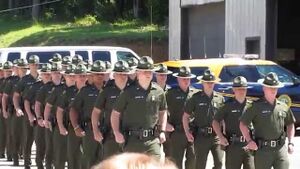Shenandoah State Police: Difference between revisions
No edit summary |
|||
| Line 25: | Line 25: | ||
}} | }} | ||
The '''Shenandoah State Police''' are a federal level law enforcement agency established in 1930 by [[Commonwealth Charter|Article 7]] of the [[Commonwealth Charter]] | The '''Shenandoah State Police''' are a federal level law enforcement agency established in 1930 by [[Commonwealth Charter|Article 7]] of the [[Commonwealth Charter]] of [[Shenandoah]] and have statewide authority to conduct law enforcement activities and criminal investigations within the [[Administrative regions of the Shenandoahan Commonwealth|nine states of the Shenandoahan Commonwealth]]. In general, the Shenandoah State Police perform functions outside the jurisdiction of the county sheriff or local police departments, such as enforcing traffic laws on state highways and interstate expressways, overseeing the security of the state capitol complex, protecting the governor, training new officers for local police forces too small to operate an academy, providing technological and scientific services, supporting local police and helping to coordinate multi-jurisdictional task force activity in serious or complicated cases in those states that grant full police powers statewide. Along with the [[Shenandoah Federal Protective Service]]. the Shenandoah State Police were created by the federal government as a result of uprisings surrounding organized labor in the coal and mine industries. | ||
==History== | ==History== | ||
Revision as of 01:21, 6 January 2021
This article is incomplete because it is pending further input from participants, or it is a work-in-progress by one author. Please comment on this article's talk page to share your input, comments and questions. Note: To contribute to this article, you may need to seek help from the author(s) of this page. |
| Shenandoah State Police | |
|---|---|
 Shenandoah State Police badge | |
| Common name | State Police |
| Abbreviation | SSP |
| Agency overview | |
| Formed | July 6, 1930 |
| Jurisdictional structure | |
| Federal agency | Shenandoah |
| Operations jurisdiction | Shenandoah |
| Constituting instrument |
|
| General nature | |
| Operational structure | |
| Headquarters | South Saint Albans, Kanawha |
| Sworn members | 6,350 |
| Agency executive |
|
| Parent agency | Department of Justice |
The Shenandoah State Police are a federal level law enforcement agency established in 1930 by Article 7 of the Commonwealth Charter of Shenandoah and have statewide authority to conduct law enforcement activities and criminal investigations within the nine states of the Shenandoahan Commonwealth. In general, the Shenandoah State Police perform functions outside the jurisdiction of the county sheriff or local police departments, such as enforcing traffic laws on state highways and interstate expressways, overseeing the security of the state capitol complex, protecting the governor, training new officers for local police forces too small to operate an academy, providing technological and scientific services, supporting local police and helping to coordinate multi-jurisdictional task force activity in serious or complicated cases in those states that grant full police powers statewide. Along with the Shenandoah Federal Protective Service. the Shenandoah State Police were created by the federal government as a result of uprisings surrounding organized labor in the coal and mine industries.
History
Article 7 of the Commonwealth Charter was ratified by the Shenandoahan Commonwealth Legislature and signed into law by Jonathan Canfield, who stated that the enactment of Article 7 "was mandatory in order to uphold the laws of our state.". Article 7 of the Commonwealth Charter empowers the federal government to appoint officers to detect, investigate and prosecute crimes committed by any subject, citizen, or foreigner against the government. The ratification of this article resulted in the creation of both the Shenandoah State Police and the Shenandoah Federal Protective Service,which became the second and third federal level law enforcement agencies. Article 2 of the Commonwealth Charter expressly allowed for the creation of the Shenandoah Customs and Border Control
Organization and services
The Shenandoah State Police are organized into nine divisions, sometimes referred to barracks, with one division being located in each of the nine states comprising the Commonwealth. Those barracks are divided to posts, the number of which vary from state to state. In addition, the Shenandoah State Police has a number of administrative and support divisions assigned to ti as well.
Superintendent of the State Police
The Superintendent of the State Police is tasked with the overall command and control of the Shenandoah State Police and holds the rank of colonel.
Deputy Superintendent of the State Police
The Deputy Superintendent of the State Police is tasked with the overall operational command of the Shenandoah State Police and reports directly to the Superintendent of the State Police. Traditionally, the Deputy Superintendent of the State Police will hold the rank of Lieutenant Colonel.
Assistant Deputy Superintendent
The Assistant Deputy Superintendents oversees the various facets of the administration of the Shenandoah State Police. In general, a Deputy Superintendent will hold the rank of Major. There are several organizations within the Shenandoah State Police which are managed by a Assistant Deputy Superintendent, these include the;
- Executive Services unit, which includes the;
- Media Relations Unit
- Personnel Unit
- Medical Unit
- Criminal Statistics Reporting Unit
- Administrative Services Unit, which includes the;
- Accounting Unit
- Planning and Research Unit
- Procurement Unit
- Promotional Standards Unit
- Legal Services Unit
- Communication and Support Services Unit, which includes the;
- Dispatch and Communications Unit
- Criminal Records Unit
- Traffic Records Unit
- Legal Services
- Forensic Laboratory
- Training and Quality Support Unit
- Training Academy
- Recertification and Requalification Unit
- Professional Standards Unit
- Field Operations Unit
- Criminal Investigations Unit
- Investigative Support Services
- Criminal Intelligence Unit
- Special Operations Unit
- Executive Protection Unit
Field Operations Unit
Under the command of the Field Operations Unit there are nine Patrol Operations Divisions, one for each state in the Commonwealth. These are often referred to barracks, and each barracks is commanded by a State Police Captain, with the various posts reporting to it generally led by a Lieutenant or Senior Lieutenant depending upon the size of the geographic area or population of the area covered.
Special Operations Unit
Shenandoah State Police Special Operations Unit comprises the following units;
- Emergency Response Unit
- Aviation Unit
- K‐9 Unit
- Explosive Response Teams
The Shenandoah State Police Special Operations Unit consists of four full time Emergency Response Unit which are trained to respond extraordinary or particular dangerous situations not suitable to be handled by regular police officers. Shenandoah State Police Emergency Response Unit will often assist local law enforcement with dangerous situations as well. There are four ERU teams currently operated by the Shenandoah State Police; one team is located in Saint Albans and acts as a quick reaction force in the event of a terrorist attack or assassination attempt against government leaders. The remaining teams are located in Beckley, Tidewater, and Whitefield.
Investigative Support Services
The Investigative Support Services Unit works in conjunction with the Criminal Investigations Unit, Patrol Operations Units, and the Communication and Support Services Unit by providing detailed and specialized support services to criminal investigators. Its units include;
- Insurance Fraud Unit
- Polygraph Unit
- Drug Diversion Unit
- Digital Forensics Unit
- Technical Operations Unit
- Cold Case Unit
- Special Victims Unit
Barracks
- Barracks 1 - South Saint Albans, Kanawha
- Post 1 - Saint Albans
- Barracks 2 - Hurricane, Huntington
- Post ? - Hurricane
- Barracks 3 - Wheeling, Cumberland
- Post ? - Cumberland
- Post ? - Summersville
- Post ? - Canaan
- Post ? - Davis
- Barracks 4 - Beckley, Appalachia
- Post ? - Beckley
- Post ? - Buckhannan
- Post ? - Martinsburg
- Post ? - Teaysport
- Barracks 5 - Morgantown, Monongalia
- Post ? - Tidewater
- Post ? - Morgantown
- Post ? - Fairmont
- Barracks 6 - Elkins, Blue Ridge
- Post ? - Elkins
- Post ? - Blue Ridge State Junior College - Elkins Campus
- Post ? - Davidsburg
- Post ? - Parkersburg
- Barracks 7 - Whitefield, Oak Hills
- Post ? - Whitefield
- Post ? - Philippi
- Barracks 8 - Point Pleasant, Oak Hills
- Post ? - Whitefield
- Barracks 9 - Clarksburg, Oak Hills
- Post ? - Whitefield
Ranks
| Title | Insignia |
|---|---|
| Superintendent - Colonel | |
| Deputy Superintendent of the State Police - Lieutenant Colonel | |
| Major | |
| Police captain | |
| Senior Lieutenant | |
| Lieutenant | |
| First Sergeant | |
| Sergeant | |
| Corporal | |
| Officer First Class | |
| Senior Officer | |
| Police officer |
Laboratories and forensic assistance
The Shenandoah State Police also runs several forensic laboratories and provide scientific investigation services to local law enforcement agencies, including laboratory facilities in Whitefield, Oak Hills, Saint Albans, Kanawha, and Martinsburg, Appalachia. Services offered to criminal justice agencies include biochemistry, drug, firearm investigations, latent prints, questioned documents, toxicology and trace evidence. The Shenandoah State Police participate in a educational program along with the Shenandoah Federal Protective Service and the Blue Ridge State University School of Forensics and Investigative Sciences to allow students access to laboratories operated by both the Federal and State Police.
Recruitment and training
They receive their training at the Federal Police Officer Training Center, located in South Saint Albans, Kanawha,. The training center is located near the agency's headquarters, also situated in in South Saint Albans. Upon appointment, cadets undergo an intense 25 week training program to become certified law enforcement officers. The Federal Police Officer Training Center also hosts classes for departments from across the nation which can not afford to maintain their own academies. In addition, the Shenandoah State Police conduct several training classes per year in rural areas across the nation to assist in training new municipal police officers and sheriff's deputies. In 2017, 57 percent of all graduating law enforcement officers nationwide were trained by the Shenandoah State Police.
Equipment
Uniforms
Shenandoah State Police officers wear a forest-green uniform and campaign hat.
Vehicles
Shenandoah State Police vehicles are composed of a variety of makes with blue and gold colors accompanied by the agency's logo on the side front doors. For many years, the agency has used Riegel Kronprinz for the road. In recent years however, State Police has phased in new Riegel Police Interceptor and Police Interceptor Utility into its fleet. The agency also uses unmarked vehicles that are usually assigned to command staff members. Starting in 2001, the Shenandoah State Police equipped both its marked and unmarked vehicles with all-0blue lighting configuastions
Weapons
Officers of the Shenandoah State Police are issued McLear semi-automatic pistols. Officers have a choice between the McLear 17 full sized pistol, or the McLear 19 compact pistols in 9x19 mm, or the McLear 21 handgun in .45 caliber. Command staff and detectives may receive subcompact McLear pistols, such as the McLear 27 or McLear 30 in 9x19 and .45 caliber respectively.
All officers with the Shenandoah State Police are trained to use the Grady Repeating Arms M-2 pump-action shotgun, and each vehicle is equipped with a single shotgun. Some officers are also trained on and equipped with the Hyborian Arclight Aero-Industries M16A4 or M4 carbine in 5.56x45 mm. Officers also utilize a variety of less-lethal options, such as the Tintreach conducted electrical weapon, telescoping batons, and OC spray

